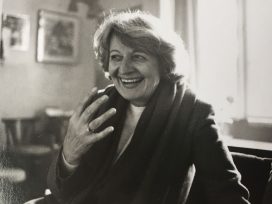Sarajevo Notebook; tribute to founding editor Vojka Đikić
Just over a year ago, Vojka Đikić, founding editor of Eurozine partner journal Sarajevo Notebook, passed away. One of her successors at the journal, Boro Kontić, has written to tell us that he and his colleagues are in the process of re-establishing Sarajevo Notebook – and to send us this tribute to Vojka, along with a translation of one of her poems.
Vojka Đikić passionately believed in the mission of culture: culture in perhaps its oldest definition, as a way of life. Be it in poetry, painting, meetings of friends or in a dish that she prepared, she believed that culture was a universal language that brings us together, ennobles us, makes us better and makes the world around us better.
She behaved that way in her life. The most terrifying war could be around us, but that was no excuse not to talk about books, about their, as she used to say, magical effect; about paintings, that frozen beauty; about the people she met who left a mark; or simply about olives, butter and bread.
She worked for Radio Sarajevo for a long time and edited the Third Programme magazine. The Radio in those days was a serious organization and it was also a guardian of the heritage of this region. Today, when you look at the collections of the Third Programme magazine, launched at the beginning of the 1970s, the sentence from the first issue becomes clear, as some sort of motto: ‘everything that is new and progressive is worthy of unreserved support and affirmation.’
The magazine was in many ways our view into the world. There, we found out, or consoled ourselves, that there will never come a time when man will not feel the need for culture. In the magazine, which Vojka edited, all the big literary names of Bosnia and Herzegovina contributed, and translations were published of the works of Borges and Octavio Paz, Susan Sontag and Marguerite Yourcenar, most of France’s cultural scene, capital essays by Vikto Shklovsky, Isaiah Berlin, Czesław Miłosz and Günter Grass.
Vojka Đikić’s work space was dominated by paintings and objects that she loved and brought herself. A big poster, a photograph of Marguerite Yourcenar, paintings and a variety of objects from Algeria, Finland and the island of Korčula. A rug on the floor. This is how Vojka transformed Radio Sarajevo’s uniform room into her own corner, which actually spoke the most about her. She would instantly turn any space into her own. Then she would fill it with her throaty voice, reverberant laughter, cascade of sentences which ended with ‘divine’ or ‘magical’; in short, you became a part of an energy to which you could react in any way, except to forget.
Vojka Đikić was an enlightener in the best sense of the word. Everything she learned, she literally rushed to share with others. For her, a finding was something that everyone had to be told about right away. Through her books or translations, she shared with all of us the time she spent in France, Algeria, England, Finland, all the countries of Yugoslavia. She left nothing hidden. She was like that in conversations too. Open, loud, joyful with almost hypnotic hands.
After the war, she came to Media Centar with the idea of a literary magazine, Sarajevo Notebook. The best literary names and the restoration of ties among authors from the former country were its foundation. Everything in two words: cooperation, dialogue.
When you look at that whole library of dozens of volumes today, 51 issues of Sarajevo Notebook (www.sveske.ba), with more than 10,000 pages of pure literature by the best authors of the former Yugoslavia, Europe and the world, you cannot help thinking about the enormous editorial endeavour. You cannot help being proud of her new poetic journey which lasted until the last hour of her 84 years.
Those who have not worked on this type of magazine can only assume, but not comprehend, what kind of strength, nerves and energy were needed for this endeavour. Cooperation and dialog with authors, with all their virtues and faults, maintaining the machinery of printing several issues a year, on hundreds of pages. Calling and negotiating, begging and threatening, so that everything reaches readers and friends on time. Basically friends, for the one who started reading the Notebook today, tomorrow became a friend of the magazine.
Vojka Djikić, poet, translator and editor, will be remembered in the cultural life of Sarajevo, Bosnia and Herzegovina, but also of the whole region. What will particularly be remembered is her creative energy and enthusiasm in bringing us together, connecting us, feeding us and cheering us up. I believe she would be happiest if we learned a part of her secret, and if we could continue to sow that human kindness.
Boro Kontić
Vojka Djikić 1932 – 2016
Founder and executive editor of the journal ‘Sarajevo Notebook’

Vojka Đikić-Smiljanić was a poet, translator and editor of cultural magazines. Treći program of Radio Sarajevo (1972 – 1992) and Sarajevo Notebook (2001 – 2016). She acted as the Editor for the Anthology of Modern Algerian Poetry, and has translated works by M. Yourcenar, M. Diba, J.J. Rabearivelo, S. Heaney, M. Longlay, K. Rain, E. de Luca, P. Holapp, M. Lacheraf, J. Senac, M. Haddad, R. Boudjedar, Y. Septi. Moreover, she has published several books, including: Pesme, Tkači vetrova, Pepelnica, Druga Zemlja and Prevođenje mora.
A Guest May Come
Hold on tight to me
And we’ll find the way home
There the fire’s still burning
And in the corners
Books lie open
That ought to be read
And the garden’s there to dig
The roses to prune
Thus it was said
When we mend the roof
And paint the red door red
A guest may come
Vojka Djikić
